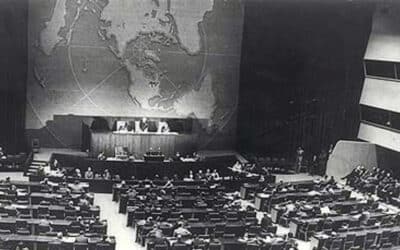The New York Times last week hinted at the real reason why the Obama administration is pushing so hard right now to get the Israelis and Palestinians back to the so-called U.S.-led “peace process”, which is the process by which the U.S. and Israel block the implementation of the international consensus on a two-state solution. Of Secretary of State John Kerry’s endeavors, the newspaper reported:
In recent weeks, Mr. Kerry and his aides have outlined several basic arguments for why his efforts might bear fruit. Perhaps the most important one, which Mr. Kerry advanced almost the moment he was picked for the State Department post, is that the United States does not have the luxury of staying on the sidelines.
With the Palestinians poised to take their claim for statehood to the International Criminal Court and United Nations bodies, American officials say the two sides were facing a downward spiral in which the Israelis would respond by cutting off financing to the Palestinian territories and European nations might curtail their investment in Israel, further isolating the Israelis….
Mr. Kerry extracted a commitment that the two sides would give the talks at least nine months, which provides some time to explore ideas without fears of a walkout.
See, the goal is to bait the Palestinians back into the “peace process” in order to prevent them from going to the U.N. General Assembly to request that the matter of Israel’s illegal colonization of the West Bank be referred to the International Court of Justice or to file a legal complaint against Israel for its violations of international law with the International Criminal Court, which Palestine now has access to since receiving non-member observer state status at the U.N. The U.S. also has a stake in preventing the Palestinians from taking such a course of action, since it is Israel’s chief benefactor and complicit in its crimes by financially, militarily, and diplomatically supporting its violations of international law.
The Israeli daily Haaretz likewise reported on the Obama administration’s motive for pushing “peace process” talks before September, under the headline, “U.S. pushed peace talks to avoid Israeli-Palestinian ‘train wreck’ at UN, says White House official”:
Fears of fierce battle within the UN General Assembly between Israelis and Palestinians in September was one of the primary reasons for the sense of urgency to renew negotiations between the two sides, a senior White House official said during a press briefing on Wednesday.
“The Palestinians throughout the course of this year have been making clear that if they couldn’t see progress on the peace front, that their intention would be to seek other elevations of their status, whether at the UN or other international organizations,” said the official.
“It is something that could have created a significant amount of friction and really interrupted the progress we want to see in the region. So it’s no secret that one of the motivating factors, I think for everybody, was to avoid that sort of train wreck that would have happened, if we weren’t able to get negotiations started.”
“With this process moving forward, the risk of clash at the UN or elsewhere is reduced or eliminated,” the official said.
That is to say, the U.S. is trying to convince the Palestinians to return to talks in order to prevent them from going to the international community, to mitigate the “risk” that the Palestinians might seek recourse for Israel’s crimes through the U.N. and other international bodies. The goal is to get the Palestinians to return to the “peace process”, the framework for which rejects any application of relevant international law.
As an indication of the means by which the U.S. is pursuing this effort, Haaretz added:
Haaretz reported Tuesday that the American government had written letters of assurance to the Israeli and Palestinian negotiating teams, in order to make the renewal of talks possible. The letters reinforced the American positions regarding the 1967 borders, Palestinian refugees, and Israel’s identity as a Jewish state. The text of the letters remains classified and will not be published.
In a follow-up article, Haaretz reported:
In the letters, the U.S. apparently clarifies to the Palestinians that the American position is that negotiations should be carried out on the basis of the 1967 line with land swaps, and makes clear to Israel the U.S. position is that the future borders will not be identical to the 1967 lines but include changes in accordance to the reality on the ground.
Moreover, the letter to Israel apparently included an American declaration stating Israel is a Jewish state and that the U.S. position is that the Palestinian refugees should return to the future Palestinian state.
It is important to understand this. Obama in May 2011 gave a speech in which he said that talks on borders should be based on the 1967 lines. This, too, at the time was to bait the Palestinians to return to the “peace process” instead of going to the U.N. However, Obama made clear at the time that this was not a reiteration of the international consensus on a two-state solution, based on U.N. Security Council Resolution 242 calling for Israel to withdraw from the occupied territories and calling for a Palestinian state alongside Israel along the ’67 lines, with the possibility of minor and mutually agreed revisions to the final border.
Instead, Obama made clear that his administration would continue the Bush administration’s policy of supporting Israel’s desire to annex major swaths of the West Bank, and longstanding U.S. policy of demanding that the Palestinians negotiate with Israel while under military occupation, contrary to Resolution 242, in calling for Israel to withdraw, emphasized the inadmissibility under international law of the acquisition of territory by war. Obama himself declared during his presidential campaign in 2008 that his policy would be one of support for Israel’s annexation of East Jerusalem, despite the fact that the U.N. Security Council has repeatedly condemned this and deemed it “illegal, null, and void”, and despite the fact that East Jerusalem is, along with the rest of the West Bank, “occupied Palestinian territory” under international law, as affirmed by the International Court of Justice.
Obama also implicitly endorsed Israel’s demand that the Palestinians recognize Israel as “the Jewish state”, meaning that they should accept that the Zionists’ ethnic cleansing of Palestine and unilateral declaration of the existence of the state of Israel on land belonging to the Palestinians were legitimate, and also that they should recognize the fifth of the population of Israel that is Arab as second-class citizens; in addition, they must renounce the internationally recognized right of return of refugees to the homes from which they were ethnically cleansed in what is now Israel.
The separate letters Obama sent to Netanyahu and Abbas with different messages for each is a move right out of the Bush playbook. As I’ve written in my forthcoming book on the U.S. role in the conflict (subscribe to my newsletter for more exclusive sneak peeks and to keep updated):
In late 1997, the U.S. attempted to revive the stalled Oslo process by determining a timeline for the implementation of Oslo II. The result was the Wye River Memorandum, signed by Israeli Prime Minister Benjamin Netanyahu and PLO Chairman Yasser Arafat on October 23, 1998. The memorandum stated that permanent status negotiations would be resumed. It said that “neither side shall initiate or take any step that will change the status of the West Bank and the Gaza Strip in accordance with the Interim Agreement.” The U.S. separately assured Arafat in a letter that “the United States will continue to make clear the importance of avoiding unilateral steps that would prejudge or preempt the issues reserved for the permanent status negotiations.” However, the U.S. also privately informed Tel Aviv what that actually meant: that it would oppose any “unilateral declaration of statehood” by the Palestinian leadership.
Nothing has changed since that last time the Obama administration tried to convince the Palestinians to return to talks with the Netanyahu government. As the Times elsewhere reported last week:
Mr. Kerry did not press for an Israeli commitment to freeze settlement construction as a condition for resuming talks.
Similarly, from Haaretz:
“It would be fair to say that you are likely to see Israeli settlement continue,” said the State Department official.
No kidding. The Obama administration has always demanded, instead, that the Palestinians negotiate “without preconditions”, meaning while Israel’s illegal colonization of their land is ongoing, thus prejudicing the final outcome of any such negotiations by changing the “reality on the ground”.
Such is the meaning of the U.S.-led so-called “peace process”.



While Mr Hammond articulates the current US rationale for getting the Palestinians back to the “peace” table; the reality is that these, and all the previous negotiations are not about peace or a just end to the conflict
https://www.newantarctica.com/human-rights/another-set-of-negotiations-for-peace-between-israel-and-palestine-sigh/
You write the “While…” as though I hadn’t pointed out myself right in the beginning of this post that “the so-called U.S.-led “peace process”, which is the process by which the U.S. and Israel block the implementation of the international consensus on a two-state solution”
Fair point Jeremy about the “while”-;though my argument is that a 2 state solution is neither feasible, sustainable nor just…
Gotcha. Thanks for clarifying that. I think it is the most feasible, sustainable, and just solution. What alternative do you have in mind? I presume a one-state solution? If so, how do you get there?
Yes-a one state solution in my view will ultimately lead to a more
stable and safe environment for all in Israel/Palestine and the wider
Middle East-getting there is the problem! From what I read, most
Palestinians would accept such a journey, Zionists and the US
government clearly would not!
While Israel continues to have
unconditional support from the US for absolutely any actions it
takes -regardless of whether it contravenes international law or
not-there is little hope of a real settlement.
Successive
Israeli governments will continue to marginalize the Palestinians
remaining within Israel’s borders and the Gaza Strip in the hope that the “problem” will overtime just disappear….
I fail to see how a one-state solution is more feasible than the two-state solution, which has the support of most of the planet, apart from the U.S. and Israel. Even if a single state was more sustainable and just, I see no way to get there but through implementation of the international consensus as a first step.
The “rest of the world” really only includes Western
Governments-certainly not most of the non-aligned states and the
populations of every middle eastern country with the exception of
Israel. The West simply follows what is required of them by the US .
Additionally when you look at the map of the Palestinian
territories, it is very clear, after the scattered patchwork that remains after Israeli settlement and “security” walls are excluded, that a Palestinian state is simply not a viable entity; nor, as the West has proved with Hamas, will the West allow a legitimate democratically elected government to exist in what remains of Palestine.
See the recent article by Robert Fisk at The Independent
https://www.independent.co.uk/voices/comment/robert-fisk-any-other-statesman-who-negotiated-peace-like-john-kerry-would-be-treated-as-a-thief-8760028.html
Paul, there is an international consensus on a two-state solution. That consensus does not include permitting Israel to unilaterally annex its settlements or land west of its illegally constructed wall. It requires full Israeli withdraw from the occupied territories. What from the Fisk piece is it you want me to take away different from what I wrote above?
I wish there was an international consensus on a no-state solution. That’ll be the day.